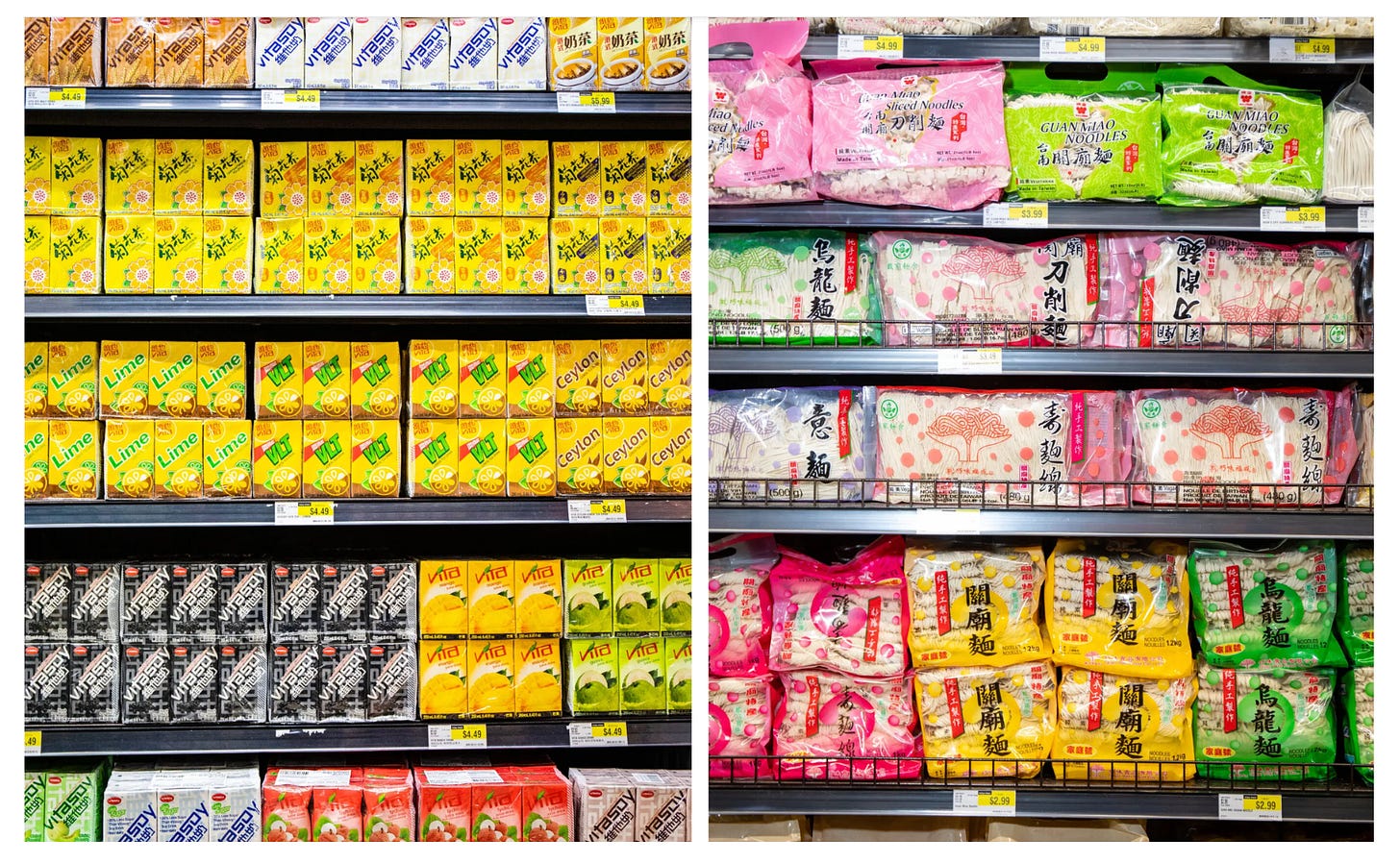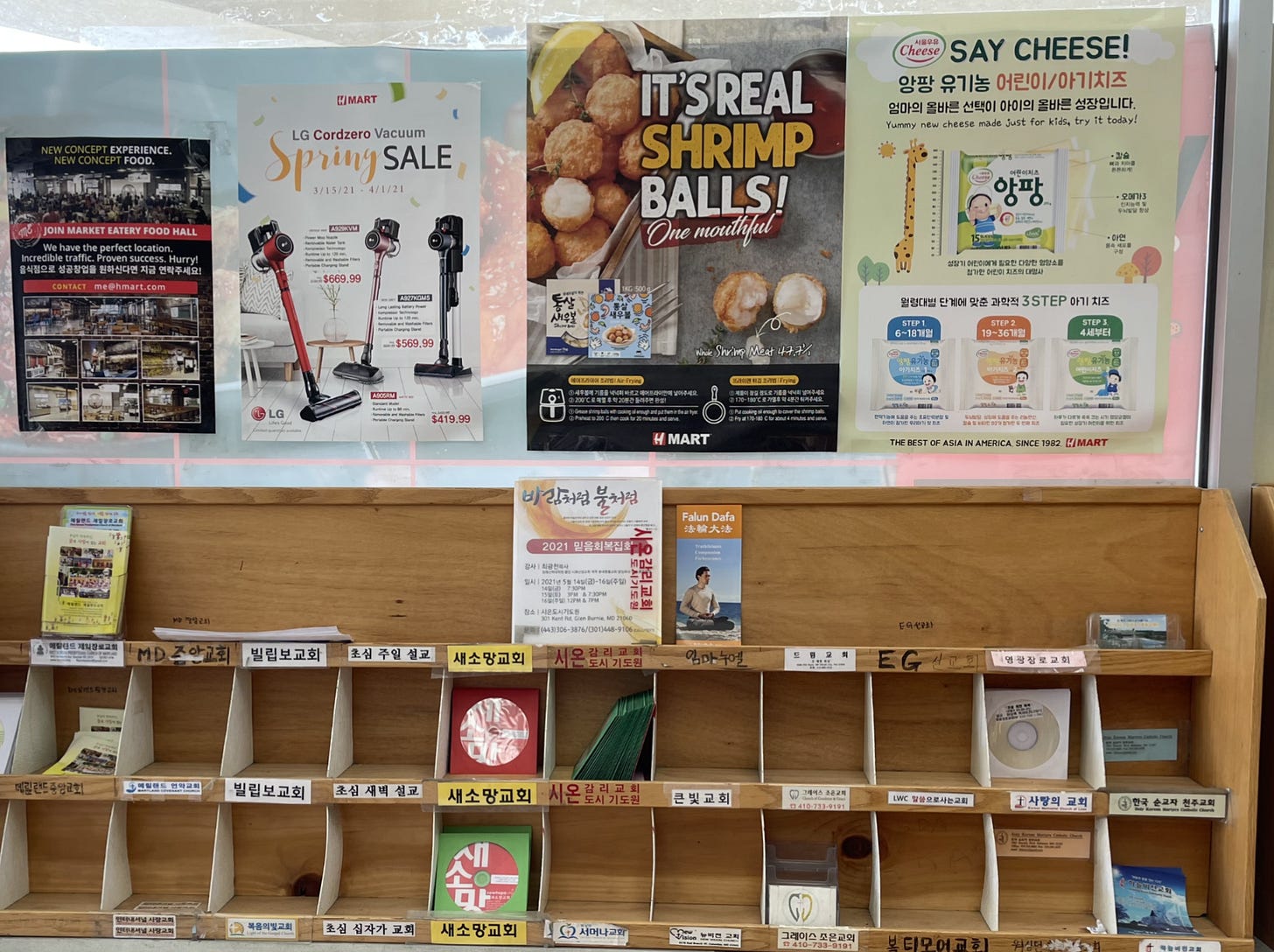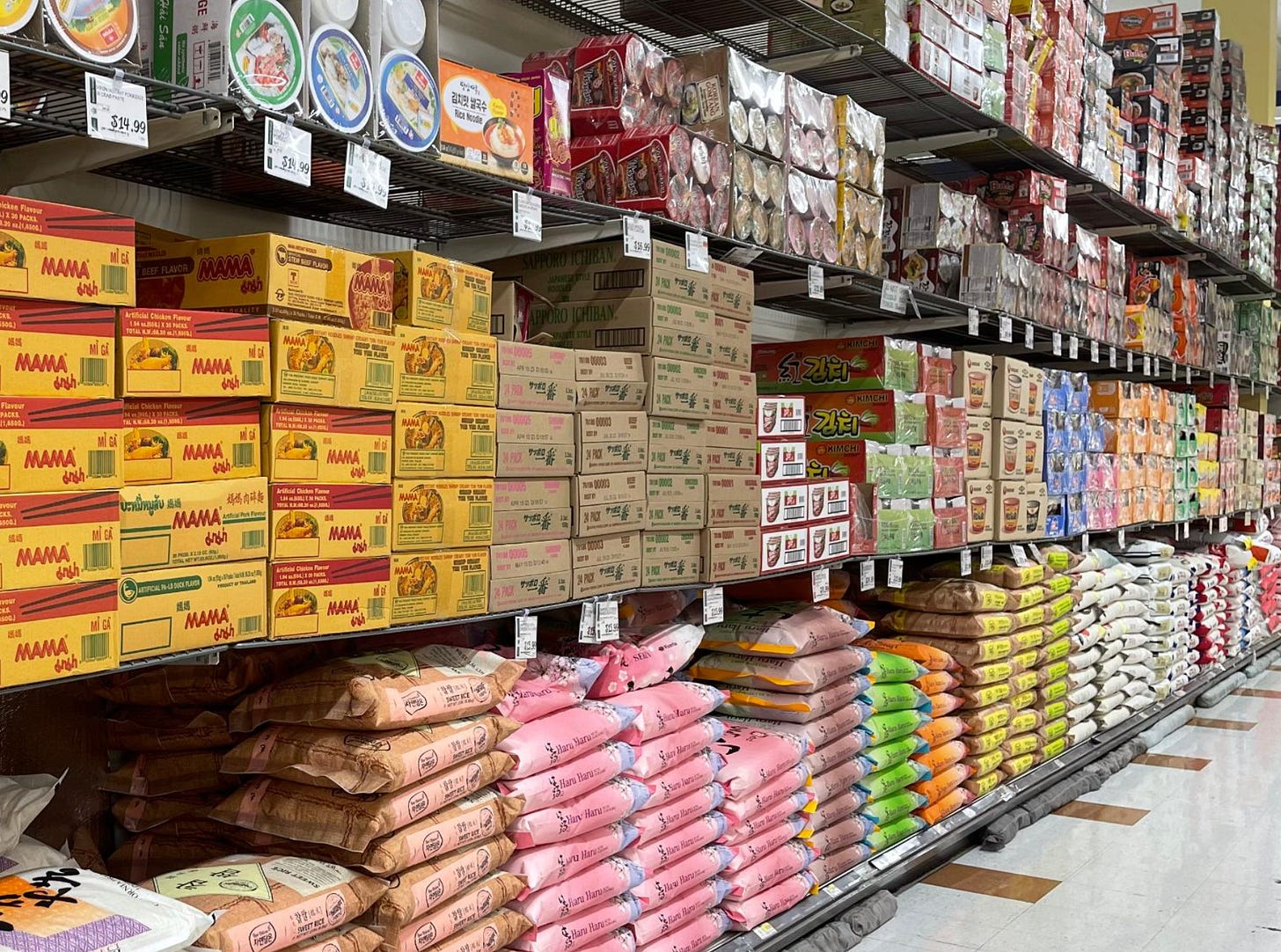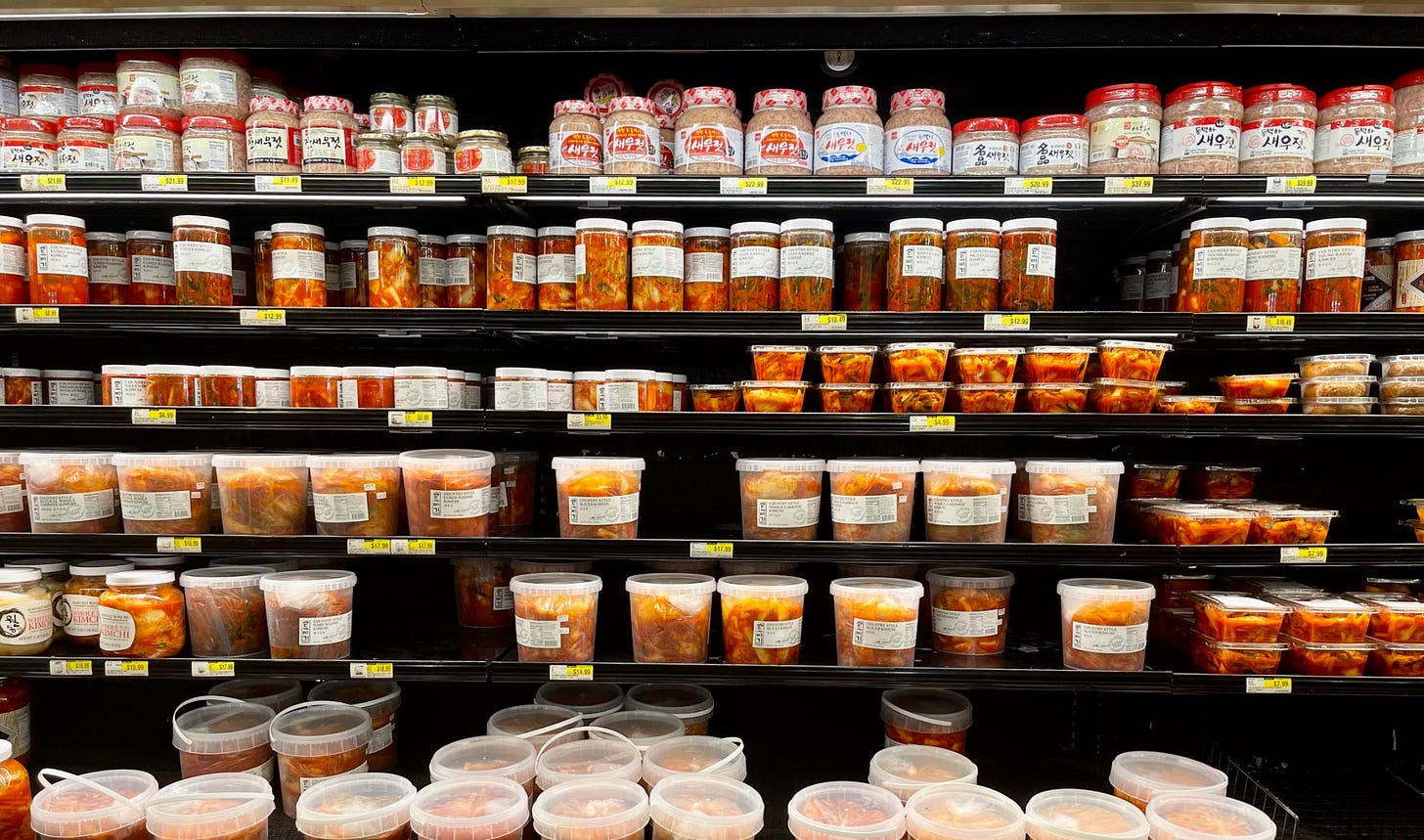Undisciplined Versions: Confessing in H Mart
On the iconic grocery store of my childhood and what it has to do with religion
“Undisciplined Versions” will (hopefully) be the Tuesday posts of some of what I’m working on around the dissertation, and whatever other kind of research I’m doing that has to do with religion and race…gender, purity, etc. and other things. I’m hoping that this will 1) keep me accountable to making this work broadly accessible, meaningful and useful for understanding how to engage religion especially in people, places, and spaces that are unexpected. Because religion is everywhere! And it’s so interesting. When it’s not terrifying, I think.
“Undisciplined” comes from Frances Tran’s work to think with and beyond disciplinary borders and boundaries in order to imagine different ways of being and belonging in the world. I think, too, about how so much of this work is translation: a version of another version, and a conversation within a larger conversation. And, of course, I’m thinking unruly, rebellious, alternative.
—
First, happy Halloween (or Candy Christmas, as we say around here)!
Every time someone asks me what my dissertation is about I think I say something different depending on my brain that day, or who is asking the question. A friend in my program a few years ahead of me (Brian H., thank you!) said that it’s helpful to think about explaining your dissertation in three tiers: lay person (like my dad or a church member), academic person (someone in another field), religious studies person. So I try to do this but I think I muddy up the different categories.
So, today, here’s the explanation: the dissertation is broadly about religion and race in “America,” but specifically about how religion is not only one aspect but mutually constitutive with the racialization of Korean U.S. Americans. I try to show how the category of race is legitimized by religion for the Korean (figure) in America, and how religion, specifically American Christianity, makes the Korean (figure) in America a necessary component of the U.S. body politic.
I look at various cultural productions as a kind of confession towards citizenship, which I argue is an important technology of the religious project of America: Korean immigrant autobiographies from the early 20th century, the writings of recently formed of Korean/Asian “progressive” Christian groups (evangelical, mainline, and Catholic), Teresa Hak Kyung Cha’s Dictee and MacArthur Genius fellow, Don Mee Choi’s DMZ Colony and Hardly War, and H Mart.
tl;dr It’s one story about the religio-racializing process around citizenship towards
becoming “American.”

One of the chapters of the dissertation is about H Mart, the Korean/Asian store that is having a bit of a cultural moment through at the very least (or most?) Michelle Zauner’s memoir and soon-to-be movie, Crying in H Mart.
But I recall the H Mart of my childhood, when it was still called 한아름 (Han Ah Reum), and barely the size of a convenience store like 7-11. Besides our church, it was the only Korean space. Although it was a good 30 minute drive away from our house, it was the only place for my parents to get a 40 lb bag of medium rice, Napa cabbage for kimchi, and a box of goguma (Korean sweet potatoes). I remember happily walking up and down the few aisles over and over looking at all the shelves of snacks and grains, sauces and packages of miyuk and gim while my mother shopped for the week. Everything was in Korean, everyone spoke in Korean, it smelled Korean. And every trip was like a pilgrimage.

When I first started to think about H Mart as a possible chapter in the dissertation, I explained to my dissertation advisor (after we moved to Annapolis, MD in 2020) I went to the H Mart in Ellicot City for the first time and saw this pictured below—in the narthex space of the exit there was a large wall dedicated to promoting the churches in the area. I wasn’t surprised, but it made me pause. I remembered seeing it in my childhood H Mart, too.

So I started to wonder, why does H Mart have this space? I can’t confirm that it’s at every single H Mart, but at every one I’ve visited I’ve seen it (Colorado, Illinois, New Jersey, New York, Georgia, Massachusetts…at least). But is it just a way to help those in the Korean diaspora connect with other Korean sites/spaces specifically Christian? Then is H Mart Christian? Or religious? Some more interesting questions became:
What is H Mart “doing”? What does the slogan a “Korean Tradition Made in America, since 1982” mean? As an ethnic immigrant grocery store in the larger suburban landscape of the U.S."? As a kind of center for the Korean/Asian diaspora in the U.S.? What might an understanding of religion tell us about the way H Mart could be an example of how (some) Koreans shape and form themselves in order to be a part of the U.S.?


What tipped me off even more about looking at H Mart in terms of religion is the language people use to engage with the space. Zauner calls it a “beautiful, holy place,” (3) and Mishan explains in her article how “Deuki Hong, 31, the chef and founder of the Sunday Family Hospitality Group, in San Francisco, remembers the H Mart of his youth in New Jersey as more than ‘just the Korean store’ — a sanctuary for his parents, recent immigrants still not at ease in English. Everyone spoke Korean, and all that banchan was a relief.’” But it isn’t just H Mart, it’s also other similar type stores as “Meherwan Irani, 51, the chef of Chai Pani in Asheville, N.C., and Atlanta, explains: An Indian grocery is not just a convenience — it’s a temple. You’re feeding the soul. Come in and pick up on the energy.”
Amazing!

And so my aim is to critique (in positive and negative ways) how H Mart is a confession of the “Korean” in America, a testimony of success, that is, a success story in economic, cultural, and political terms, one that validates the place of the Korean in the U.S. American citizen-body. It’s a look at the mixing of (the problems of) model minority myths, capitalizing on the perpetual foreigner status, considering the transpacific negotiations of geopolitical power (like how H Mart may have initially received funding from a South Korean government that was in support of and supported by U.S. American “interests”).
The larger project is to show how a religious studies approach can tell us something useful about how everyday things (connected to larger institutions) work in our lives—how they shape us, how they are an extension of who we are, and how they legitimize our very presence, and … what narratives we tell in order to belong. (I look at H Mart as a “text” in itself as well as the texts around H Mart like cookbooks, travelogues, and a young adult fantasy series.)
Maybe this is also a plug for getting a religion degree! To show how religion is a weird and fun(?) way into thinking about how people construct their lives, communities, and the world!
My desire is that all this might ultimately be an encouragement for us to cultivate practices of seeing and listening for the stories that we humans tell in general, but also those that we craft to make ourselves legible to the larger structures that confirm/affirm our existence.
These stories are never just one thing. Some are hard and sad. Some are beautiful and challenging. All of them contain multiplicities. So might we together cultivate practices around asking questions, and even more, inquiry and “study,” and what it means to hold sustained attention around some thing?
I hope I’ve piqued some of your interest. Next time, sometime, more on Christian exceptionalism, neoliberal capitalism, and commodities of race, or H Mart as an icon.
Some questions to consider, in general, for reflection:
How important is food to one’s religious and/or racial identity?
What’s happening at your local grocery store? Who shops there? What kinds of foods are there? Who works there? How do you see everyday places like grocery stores shaping our (religious) identity? What other spaces are doing similar kind of work on us? What kind of work is being done?




This is an awesome analysis. It is practical, inviting, and clear. It also helps me think about how to live more faithfully towards Jesus who is constantly exposing the systems that make and remake my worldviews of myself and others. I’m sending this to my Taiwanese mother in love who loves h mart.
Awww thank you, Julian! So appreciate your response.